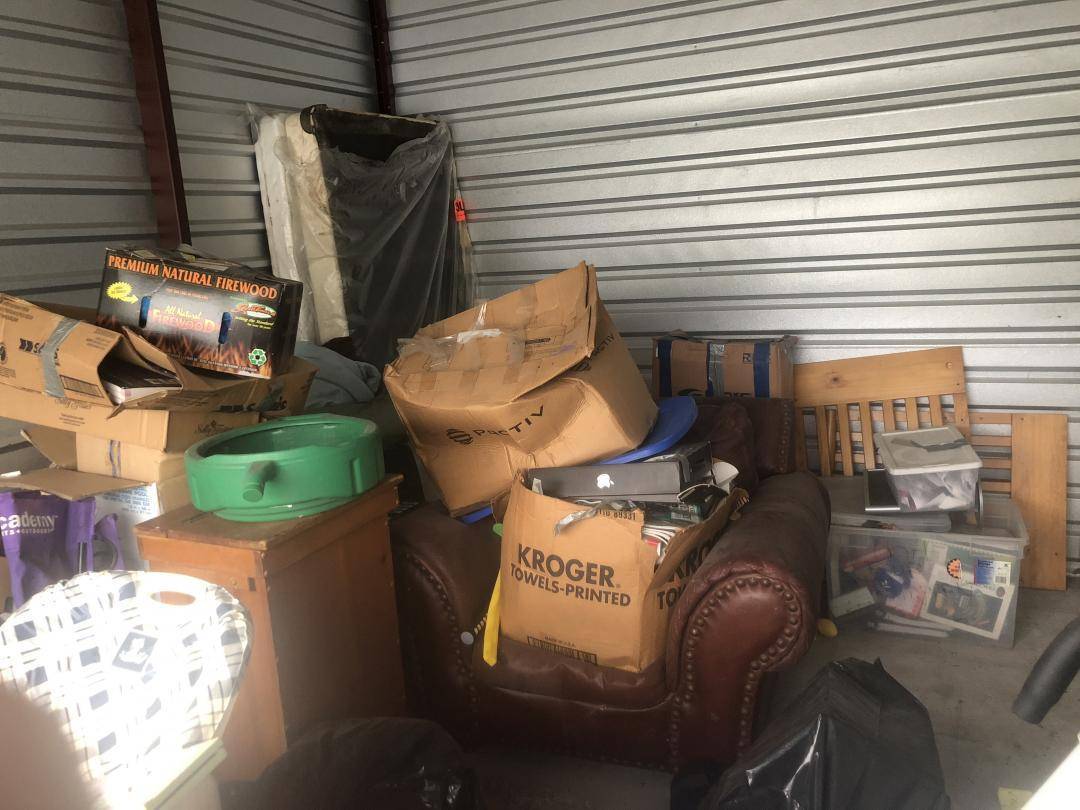Hey guys! Rebecca of Storage Heroes here… This is a topic that comes up all the time, and honestly, it’s one that I personally have had a lot of problems with. What are you supposed to do with items that you find of a personal nature in storage units? It IS possible though to be a storage unit buyer AND a good person, all at the same time! We do revise this policy from time to time, but so far, here’s what my company’s policy is, and what I advise my clients to do. It’s also seen as pretty industry standard, so I think most people would agree with me on this. If you don’t, feel free to leave a comment!
First of all though, let’s just cover again (really quickly) what the storage unit foreclosure process is. It’s not the same in all the states, and certainly different auctioneers can tell you what their individual policies and procedures are a little differently (You can look at the resources on StorageTreasures.com for individual state laws), but they are at least kind of similar in structure. Here’s what a typical process is:
1. Person does not pay their storage unit bill.
2. Storage facility calls person and lets person know they are past due
3. Person does not show up to pay bill even after courtesy reminder call
4. Storage unit cuts person’s lock off of the door, and replaces with storage facility lock. (We get this question all the time, should you be suspicious of a unit that has the facility’s lock on it, but think about it– if they DIDN’T do this, what’s to stop the tenant from just showing up, collecting their things, and leaving without paying the tab? The facility owners have to hold the items to collect their past due bill). We have a blog explaining the double-lock and security tag process, so if you’re curious about that make sure to read future posts!
5. Step #4 should be enough to let person know that stuff has been seized temporarily, but people are sometimes a little unaware– so often times the storage company will put a tag or note on the door saying “contact management”, “please pay your bill”, or “if you do not pay your bill you will lose your stuff. This means NOW”
6. Person still does not pay bill.
7. Storage unit decides to auction person’s stuff off to recoup some of their funds. Storage unit has to follow certain laws (see below) and has to pick a certain date at least 14 days away. They have to get a licensed auctioneer to conduct auction. They have procedure and protocol they have to follow (see below).
8. Storage unit must by law advertise in a public newspaper at least 10 days before the auction. They are required to put the tenant’s name so they can see they are being foreclosed on, (or their friends will see it and let them know) as well as the unit number. And if there’s STILL doubt about what the person is losing, they are also required to list some of the contents in the locker. It lists the date and time of the auction. We have actually seen so many of these facilities get sued by tenants who said they “did not know” their unit was up for auction that they actually keep a file with a copy of the newspaper ad, photographs of what’s in the unit, an itemized list of what’s in the unit, as well as copies of the certified letter, voicemails left, etc. They even are getting more careful when they list the tenants name. If the tenant is Robert L. Jones, for example, they will list Robert L. Jones, Robert Jones, Bob Jones, Bob L. Jones, R.L. Jones, etc. in the paper. It’s kind of silly, but I have seen tenants say they didn’t know they were being auctioned because their name was spelled incorrectly and then try to sue or claim damages.
9. The tenant has until the DAY of the auction to pay. They can literally run up during the auction and yell “stop, stop, I have the money!” — and then the auction is ceased. I’ve seen it happen. We have even won units at auction before at auctions that occurred THREE HOURS LATE, only to have the tenant rush in AS we were receiving our receipt in the office after the fact. It’s discouraging, (especially when the posted auction time was 12pm and the tenant ran in at 4) but understandable. The facility ALWAYS does better by keeping the tenant (happy customer, more rent in future months, no legal hassle, etc) then by selling their stuff at auction.
So, with that said, it’s obviously NOT a quick process. There are many reasons why someone can be past due. Where I am located, we never forget that we are still dealing with a lot of people here in New Orleans who are still in some way trying to get their lives back together after Hurricane Katrina. My point though is that we usually don’t know the tenant’s backstory.
[ig_divider style=”dotted”]
PERSONAL ITEMS – If we find a diploma, or birth certificate, or a box of photographs, or baby teeth, or whatever— we return that to the office whenever possible and they usually pass it on to the customer. Some offices will tell you not to bother because they’ve already sent certified letters, made phone calls, and taken the tenant to court and even hired a private investigator and they still can’t find them– so they just want you to throw the stuff away. But for the most part, we try to always return things that are of little value to us and great value to others. We’ve even gone above and beyond by returning things to tenant that DID have value (bronzed baby shoes, sterling silver baby spoons, etc)– just because of the sentimental value attached to it.
Read More: The Simpsons – Storage Battle Episode
Here are a few situations where we felt it appropriate to return the tenant’s items to them. Currently, the items we return are:
1) Personal items – yearbooks, photographs, etc
2) Sentimental jewelry (Class ring, wedding ring, grandma ring)
3) War memorabilia
4) Paperwork – tax returns, leases, water bills, etc
5) Items of a loved one who has passed away – Funeral guest books, or in the case of a baby- their baby clothes, or a loved one’s prized item (grandma’s sewing machine), etc.
6) Items necessary for medical reasons – Diabetic insulin, needles, prescriptions, etc.
Leave your comments below, please! We’d love to hear them and your experiences with this topic. You can also find us on Facebook at http://www.Facebook.com/StorageHeroes
Rebecca Fox








